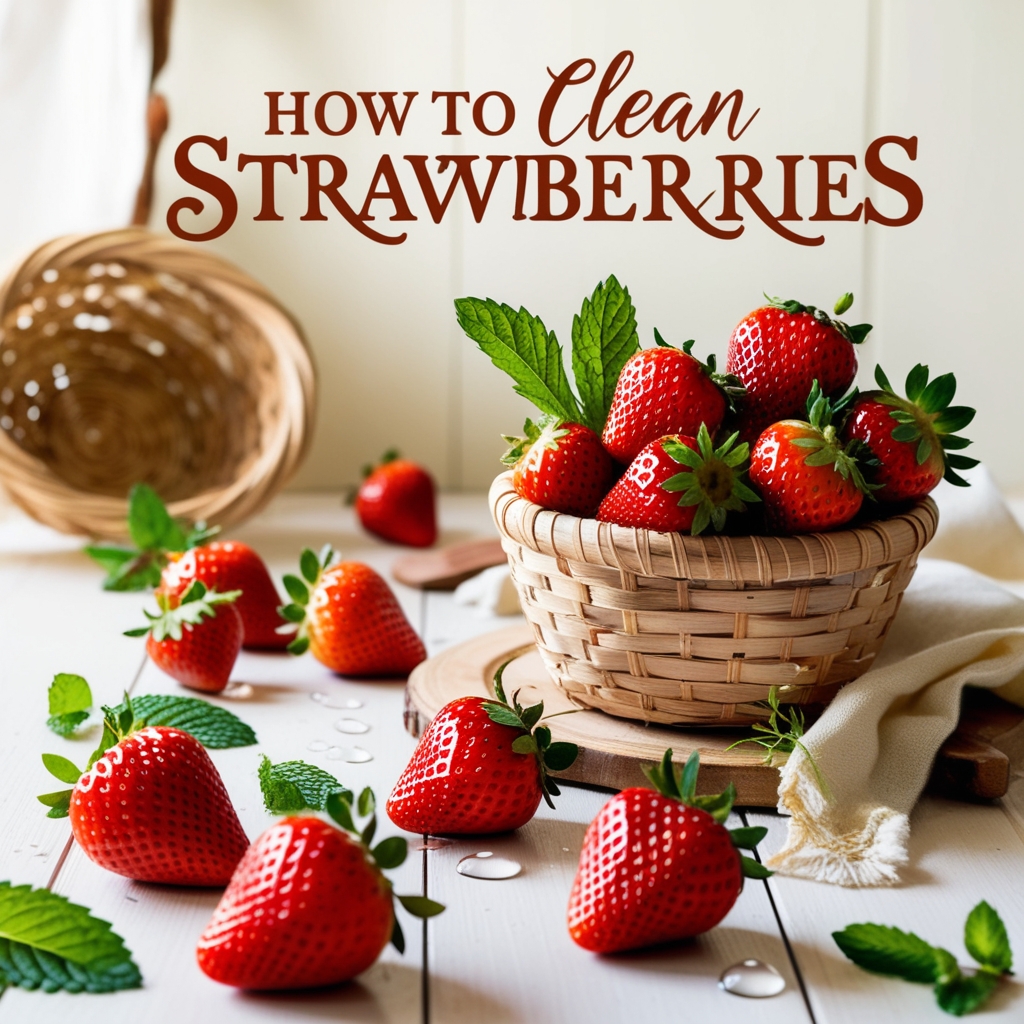Strawberries are delicious, nutritious, and a favorite treat for many. But do you know how to clean them properly? Ensuring your strawberries are free from dirt, pesticides, and harmful bacteria is essential for both your health and the berry’s taste. Let’s dive into the best ways to clean strawberries step by step.
How to Clean Strawberries
Table of Contents
Learn the best methods to clean strawberries effectively. Discover step-by-step instructions using water, vinegar, and salt for fresh, delicious, and safe strawberries.

The Importance of Proper Cleaning
Health Concerns
Strawberries are often exposed to pesticides and can harbor dirt or bacteria. Consuming unwashed berries can lead to potential health risks, such as stomach upset or exposure to harmful chemicals.
Preserving Taste and Quality
Clean strawberries not only taste better but also stay fresh longer. Dirt and residue can dull their natural sweetness.
What You Need to Clean Strawberries
- A colander or strainer.
- Fresh, cold water.
- White vinegar or salt (optional).
- A clean kitchen towel or paper towels.
Step-by-Step Guide to Cleaning Strawberries
Pre-Rinse Preparation
Before washing, sort through your strawberries. Discard any that are overly mushy, moldy, or damaged. Removing the spoiled berries prevents them from contaminating the rest.
How to Wash Strawberries Properly
Place your strawberries in a colander or a large bowl. Run cold water over them gently, or fill the bowl with water and swirl the berries around to remove loose dirt. Avoid using hot water, as it can soften the berries too much.
Cleaning Strawberries with Vinegar
Vinegar is a fantastic natural cleaner that removes bacteria and pesticide residues.
- Mix one part white vinegar with three parts water in a bowl.
- Soak the strawberries for 5–10 minutes.
- Rinse thoroughly under cold water to remove any vinegar taste.
Using Saltwater to Clean Strawberries
Saltwater helps to eliminate tiny pests hiding in the berries.
- Dissolve one tablespoon of salt in a bowl of water.
- Soak the strawberries for about 5 minutes.
- Rinse them thoroughly to ensure no salty residue remains.
Avoiding Soapy Water
Never use soap or detergent to clean strawberries. The porous nature of the fruit can absorb these substances, making them unsafe to eat.
Drying Strawberries After Cleaning

Lay your cleaned strawberries on a clean kitchen towel or paper towel. Pat them gently to remove excess moisture. Allow them to air-dry completely before storing them.
Cleaning Strawberries for Immediate Consumption
If you’re planning to eat the strawberries right away, a simple rinse under cold water and gentle pat-drying will suffice.
How to Clean Strawberries for Storage
To store strawberries, clean and dry them thoroughly. For refrigeration, keep them in a container lined with a paper towel to absorb excess moisture. For freezing, freeze the berries on a baking sheet first, then transfer them to an airtight container.
Common Mistakes to Avoid When Cleaning Strawberries
- Soaking strawberries for too long, which can make them soggy.
- Not drying them properly before storage.
- Using hot water, which can damage the berries.
Tips for Buying Fresh Strawberries
Choose strawberries that are bright red, firm, and free from mold. The greener the stems, the fresher the berries.
Conclusion
Cleaning strawberries may seem like a simple task, but doing it right ensures that you enjoy the full flavor and health benefits of these delightful fruits. Whether you’re snacking, cooking, or storing them, clean strawberries are always the best choice.
FAQs
1. Can I clean strawberries without vinegar or salt?
Yes, a simple rinse with cold water is effective for removing surface dirt.
2. How long can I store cleaned strawberries?
Properly dried and refrigerated strawberries can last up to a week.
3. Do I need to remove the stems before cleaning?
No, keeping the stems on helps prevent water from seeping inside the berries.
4. Can I freeze strawberries after cleaning?
Absolutely! Just make sure they are completely dry before freezing.
5. Are organic strawberries safer to eat unwashed?
Even organic strawberries should be cleaned to remove dirt and bacteria.